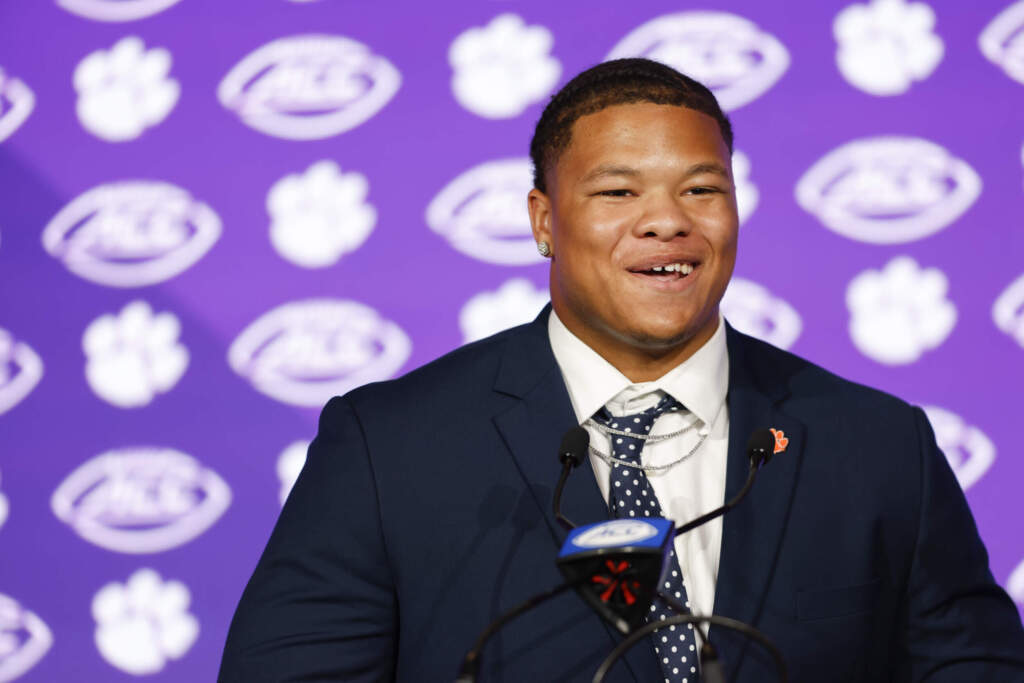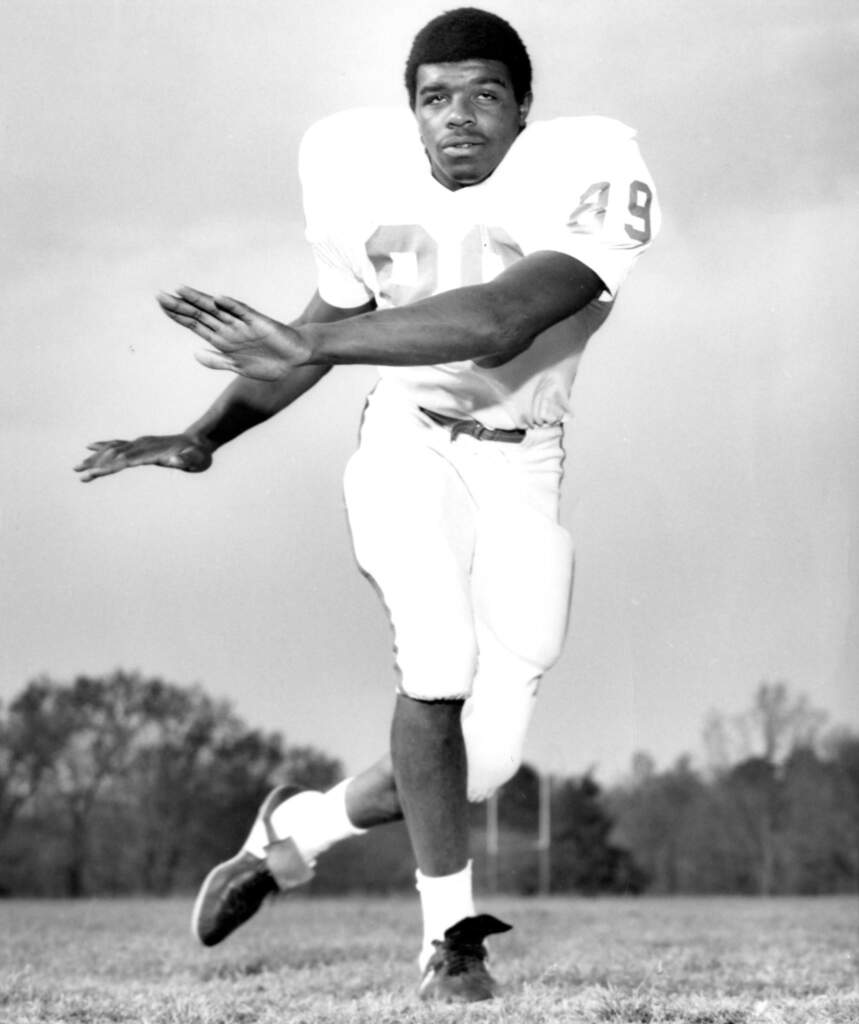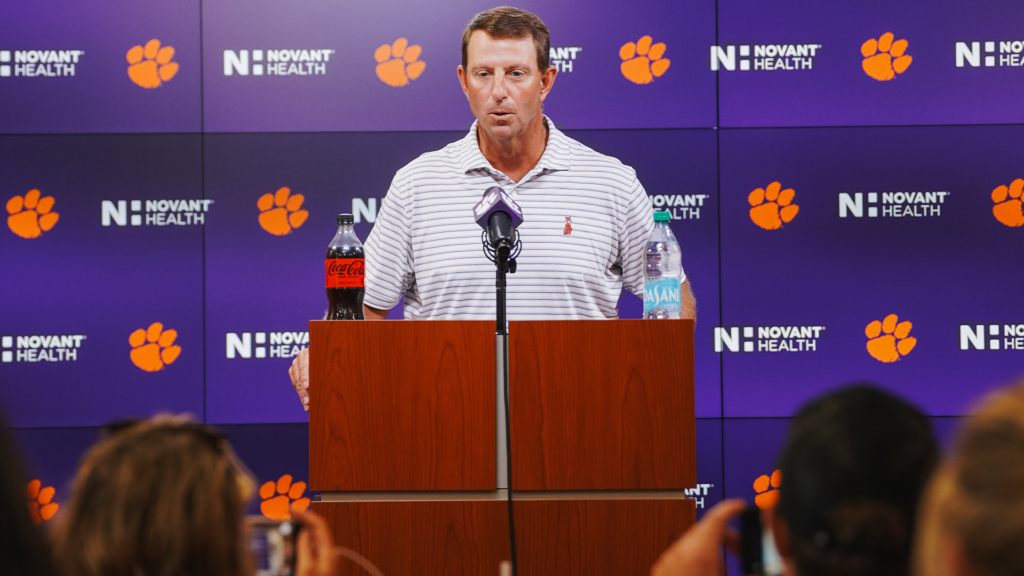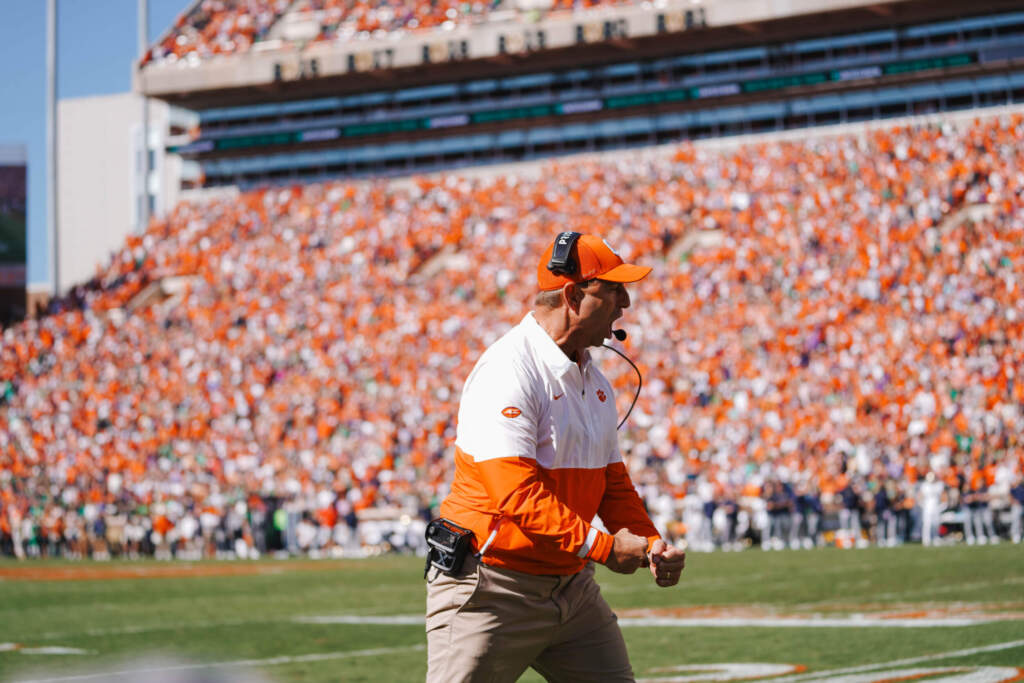William PerryFootball, 1981-84
William “The Refrigerator” Perry left a lasting impression on both Tiger fans and the National Football League. He was a member of the 1981 National Championship Team and now becomes the seventh player from that squad to be inducted into the Clemson Hall of Fame. He was also one of four national champions to be named to the Clemson Centennial Team in1996.
During his Clemson career, Perry anchored the defensive line as a three-year starter like no one before him. From 1982-84, he was a three-time All-ACC selection at middle guard and also was named to the All-America team those same years, the first three-time All-American in Clemson history and still one of just two in school history (Anthony Simmons is the other).
In 1984, Perry earned honors as the ACC Player of the Year while leading the nation in tackles for loss with 27 and averaging 2.45 tackles for loss per game. He led the team in total tackles with an even 100. He finished runner-up to current All-pro defensive lineman Bruce Smith for the Outland Trophy Award that season, given annually to the nation’s top lineman. When his career as a Tiger came to a close, the number “66” on the back of his jersey was unmistakable to Clemson fans everywhere. The numbers show the impact Perry had on the Clemson program. The Tigers were a combined 37-6-2 during his career, including a 23-1-2 record at home. Ironically, he never tasted defeat in Death Valley until his final home game. The Tigers lost just two ACC games in the four years Perry was on the gridiron, as Clemson was a combined 24-2 against the ACC during his four years.
The Chicago Bears drafted Perry in the first round of the 1985 NFL draft and he wasted little time making an impact in the league. As a rookie playing in the 1985 Super Bowl, Perry scored on a punishing up-the-middle touchdown run as a fullback in the fourth quarter to help lead the Bears to their first and only Super Bowl victory in team history. With the Super Bowl victory it meant Perry won a National Championship at Clemson in his first year of college football, then won a Super Bowl Championship with the Bears in his rookie year in Pro Football.
Perry went on to play seven seasons for the Bears before he was signed the Philadelphia Eagles in 1994. After earning a starting role on the defensive line, Perry played for two seasons before retiring from pro football in 1996. He joins Dwight Clark as the only former Tiger football players to appear on the cover of Sports Illustrated as a professional football player. Perry earned another honor this summer when he was named to the ACC’s 50-year Anniversary football team, none of nine Clemson players on the team. His brother, Michael Dean Perry (1984-87 at Clemson) also made the club, helping Clemson to a first-place ranking among players on the prestigious team.
Gary BarnesFootball, 1959-61
A member of the Clemson Centennial Team, Gary Barnes was a three-year starter for the Tigers. In 1959 he was named first-team All-ACC as a wide receiver while leading Clemson to a 9-2 record and a post-season appearance in the Bluebonnet Bowl. During that game, Barnes made school history when he caught a 68-yard touchdown pass in the fourth quarter that helped lead the Tigers to a win over then seventh-ranked TCU. His touchdown reception is still the longest scoring play in Clemson bowl game history.
Barnes was a second-team All-ACC player in 1960 and 1961 and went on to play in the East-West Shrine Game at the conclusion of the 1961 season. He was a two-time honorable mention All-American at Clemson and finished his career with The 6-4 receiver had also played defensive back and and returned kicks during his career so his all-around efforts were a needed commodity in a day when football players went both ways.
Barnes probably enhanced his draft status in an all-around performance against Furman his senior year. During that game he had 33 yards rushing, 33 yards receiving, a 72-yard punt return and a 51-yard interception return for 189 total all-purpose yards. The Packers drafted Barnes in the third round.
Barnes enjoyed an NFL career that spanned from 1962-68. He played in 60 total games with Green Bay, Dallas, Chicago and Atlanta. He might be the only player in pro football history to play for Vince Lombardi, George Halas and Tom Landry. Add in his experiences playing at Clemson for Frank Howard and you can see that Barnes benefited from some of the great coaches in football history. His very first year the Packers won the 1962 World Championship. In 1966 he became the first player to sign a contract with the Atlanta Falcons and he scored the franchises first touchdown that season. He retired at the conclusion of the 1968 season. For his NFL career he caught 41 passes for 583 yards and two touchdowns.
A former native of Fairfax, AL, Barnes now lives in Clemson and has served the city as a municipal judge for 16 years. Through his service to Clemson both on the field and in the courtroom, Gary Barnes has proved his valor as a Hall of Fame inductee.
Bert HeffernanBaseball, 1985-88
“He is the toughest I have ever had,” said Bill Wilhelm to Greenville News columnist Dan Foster in a May 1988 article. That is quite a statement for a coach who at that point had served Clemson for 31 years.
Wilhelm was a catcher himself by trade in his youth and certainly had an appreciation for Heffernan’s ability to block errant pitches around home plate. Heffernan saved many a wild pitchers in his 259 games behind home plate.
Wilhelm had unparallel consistency over his 36 years, as he never had a losing season. But, Heffernan’s arrival began a resurgence in the program. The Tigers did not go to the NCAA Tournament between 1982-86, but by Heffernan’s junior year, 1987, the Tigers were back in the field, competing for a berth in the College World Series. In fact, in 1987 and 1988 combined, the Tigers won 108 games, exactly 54 each season, and finished in the top 15 of the final polls.
At the conclusion of his junior year, Heffernan was a ninth round draft choice of the Texas Rangers. He turned down the pro offers and returned to Clemson for his senior year. The return to Clemson did not hurt his draft status as he was a ninth round pick after his senior year by the Milwaukee Brewers. The return allowed him to finish his degree requirements.
Heffernan’s career can be characterized by the aforementioned hustle and determination when it came to defense, but also consistency on offense. As a sophomore he batted .331, as a junior he batted .335 and as a senior he hit .337. He had between 15-18 doubles those last three years and had between 80-89 hits all four years of his career.
Prior to Khalil Greene’s incredible 2002 season that brought him national player of the year honors, Heffernan held the Clemson career marks for games played, at bats, runs scored and walks. He is now third in total hits, fourth doubles and fifth in total bases. A catcher, Heffernan had 54 career stolen bases. Case closed when it comes to his all-around abilities. Heffernan was named an All-ACC catcher twice and also was named a first-team All-American by the American Baseball Coaches Association in 1988, his senior season.
Heffernan played many years in the minor leagues and finally reached the Majors in 1992 with the Seattle Mariners. Now a member of the Clemson Hall of Fame, Bert Heffernan will always be remembered for his tremendous success, his love for the game of baseball and the way he represented Clemson University
A native of New York, his accomplishments have stood the test of time in this area. This year he will be named as one of the members of the ACC 50-Year anniversary baseball team.
Mary Anne Cubelic-GrantWomen’s Basketball, 1979-83
For Mary Anne Cubelic-Grant, the path to the Clemson Hall of Fame is marked by groundbreaking success in the women’s basketball program. It has taken a while, but she is finally receiving her due.
Cubelic-Grant was a teammate and classmate of all-time great Barbara Kennedy-Dixon, the only women’s basketball player in history to have her number retired and the only female athlete in school history to be inducted into the Clemson Ring of Honor.
A look to Kennedy-Dixon’s ACC record 3113 points and 1252 rebounds certainly show she is deserving of that stature. But, she had a teammate who helped her score many of those points and get many of those reboundsŠand help the Lady Tigers to many significant victories. As a player, Cubelic-Grant earned All-ACC honors in 1982 and 1983. She also teamed Kennedy -Dixon to lead Clemson to its first-ever top 20 national finish in 1980-81 and the school’s first ever NCAA Tournament appearance in 1981-82. That 1980-81 season was very significant as the Lady Tigers under Coach Annie Tribble won the school’s first ever ACC regional season championship, and defeated five top 20 teams throughout the season, including #2 ranked Old Dominion, and #7 ranked Tennessee.
During that 1981-82 season, she averaged a career high 17.1 points per game and was also named the team’s top defensive player. She was also named an honorable mention All-American during her senior season in 1983.
Cubelic-Grant completed her Clemson career as one of the most memorable players in Lady Tiger history. Her success on the court also helped lay the foundation for the team’s current prestige and achievement. She finished her career with 1,501 points and 651 field goals, which are still ranked fifth and fourth place, respectively, on Clemson’s all-time lists.
Known for her all-around abilities, she never quite recorded a triple-double, but came close on many occasions. She is still fifth in school history in points scored, but is also sixth in total assists and sixth on a per game basis. She is the only Lady Tiger in the top six in school history in scoring and assists. She started 99 games in her four years and is still fourth in assist/turnover ratio.
These are outstanding bottom line stats, but her diligence should also be noted. She missed her entire freshman year due to a knee injury and she needed three knee injuries altogether to complete her four years on the hardcourt. Mary Anne Cubelic-Grant’s accomplishments on the court have helped pave the way for other talented Lady Tigers, one of the sports greats in the program’s first decade who has set a standard for future Lady Tigers.
Kevin JohnsonGolf, 1985-88
Kevin Johnson certainly had a positive impact on the heritage of Clemson golf and Clemson athletics. He became the program’s first three-time All-American and brought Clemson to new heights through his performance on the course and his team leadership.
A native of New England, Johnson was a third-team All-American as a sophomore in 1987, a first team choice as a junior in 1988 and a second-team selection as a senior in 1989. He was the ACC Champion in 1988 as a junior, Clemson’s second ACC Champion in history and first since 1976.
Johnson brought Clemson much acclaim through national amateur events. In 1987 he was the United States Public Links Champion and the following year was the runnerup. Those finishes get you in the Master’s today, but did not in the 1980s. Johnson also played in the World Cup and the Walker Cup, the first Clemson golfers to appear in either event. He was the D.J. Trahan of the 1980s when it came to Clemson golf.
Johnson led the Clemson team to a third-place finish at the 1989 NCAA Tournament in Oklahoma. He would have been the NCAA Champion at that event had he not been rushed to the media room by NCAA officials prior to signing his scorecard after the second round. NCAA officials ruled he did not turn in his card in a timely manner (even though officials told him to leave the scoring tent to attend the media interview) and his second round 66 was disqualified. He overcame the heart break to lead Clemson to its highest finish ever. Johnson still ranks in the top 10 in Clemson history in stroke average, rounds in the 60s, rounds at par or better and rounds under par. He is still number-one in top 10 finishes, a mark D.J. Trahan will strive to beat this year.
Johnson has continued to represent Clemson well as a professional. He played on the PGA Tour in 2001 and is a multi-year veteran on the BUY.com tour. He qualified for the United States Open in 2000 and 2001 and is a three-time champion on the BUY.com tour, winning the 1997 Puget Sound, the 1999 South Carolina Classic and the 2000 Permian Basin Open.
A visitor to the Clemson campus whenever the Tour brings him to the Southeast, Johnson was named to the ACC 50-Year Anniversary Golf Team in August. He certainly brought Clemson golf to a new level, leading Clemson its first top four finish in 1989.
Bobby RobinsonClemson University Athletic Director, 1985-2002
Since his tenure as athletic director began in 1985, the progress that marks Bobby Robinson’s impact at Clemson is difficult to express in words. Looking at numbers instead, one finds that during the Robinson era, Clemson University won 57 ACC championships and all 19 of Clemson’s sport programs were ranked in the top 20 nationally at one time or another.
In the All-Sports rankings, which rates school programs on an overall scale, Clemson was ranked in the top 25 nine times following Robinson’s promotion to director of athletics in 1985, the position from which he resigned on July 1, 2002.
Overall, Clemson had nine top 25 programs in 2001-02 to go with 11 top 25 finishes in 2000-01, showing that Clemson succeeded at a high level even in his final years as athletic director. Over his career, Clemson had 151 top 25 seasons, an average of nearly nine per season. Sixteen of the 19 programs had at least one final top 10 ranking during his career, including 10 programs that had a top five national finish.
Women’s programs flourished under Robinson. Seven of the nine Lady Tiger teams had a top 10 final ranking, including four that had a top five finish. The women’s soccer program ranked in the top 15 and participated in the NCAA Tournament every year of its existence under Robinson. The women’s basketball team advanced to NCAA Tournament play 14 of the last 15 years.
The revenue sports also held a prominent place nationally. The Tiger football team went to a bowl game 14 of his 17 years as athletic director and the men’s basketball team advanced to postseason play 12 of 17 years, including a #8 national finish in 1996-97. Overall, Clemson had nine top 25 programs in 2001-02 to go with 11 top 25 finishes in 2000-01, showing that Clemson succeeded at a high level even in his final years as athletic director. Over his career, Clemson had 151 top 25 seasons, an average of nearly nine per season. Sixteen of the 19 programs had at least one final top 10 ranking during his career, including 10 programs that had a top five national finish.
Robinson began working for Clemson University in 1970 and made his first real impact as Clemson’s golf coach from 1974-1983. As coach, he delivered the program’s first ACC championship in 1982 as well as its first top-five national finish in 1983. He recruited Clemson’s first golf All-American in Clarence Rose, who went on to a 20-year PGA career. Dillard Pruitt, Clemson’s first multiple year All-American, was also a Robinson recruit.
Aside from the obvious progress marked by numerous championships and national rankings, Robinson may be remembered best for his academic impact on the athletic program and the induction of Vickery Hall (see page 120). Opened in 1991, Vickery Hall was the first stand-alone facility for student athletes in the nation and several universities have copied its concept since then.
The academic GPA of Clemson’s student-athletes has risen from 2.35 to 2.85 over the history of the building and the program has set records for number of athletes on the ACC academic honor roll, dean’s list and President’s List honorees.
Bobby Robinson was awarded the Order of Palmetto by the state of South Carolina on April 17, 2002 for his service to the state. As an inductee into the Hall of Fame in 2002, Clemson University now recognizes one of its greatest contributors to both academic and athletic excellence.
Bill FosterHead Basketball Coach, 1975-84
Bill Foster had many landmark accomplishments as Clemson’s head basketball coach from 1975-84. In his nine years at the helm of the Clemson program he led the Tigers to 156 wins, including 16 against top 20 teams, still tied for the most wins over top 20 teams in history. Thirteen of the 156 wins were overtime victories, also a Clemson coaching record in that category.
Foster led Clemson to 40 wins his first two years, including consecutive wins over top five teams on the road in the ACC in his first year. That first year also included Clemson’s first ever win in Cameron Indoor Stadium. A 22-6 campaign in 1976-77 was led by all-time great Tree Rollins and included wins over North Carolina, NC State and Maryland. Rollins averaged a double-double over his four years at Clemson, two under Foster’s leadership.
Foster’s best year and perhaps the best year in Clemson basketball history took place during he 1979-80 season when he guided the Tigers to a23-9 overall record and a berth in the Final Eight of the NCAA Tournament. That is the only time a Clemson team has been just one step from the Final Four. The Tigers lost to eventual NCAA runnerup UCLA by just 11 points.
That 1979-80 season included six wins over top 20 teams, still a school record for a single season. That total included an 87-82 overtime victory against #1 ranked Duke, the first time in history Clemson had beaten the nation’s top ranked team in basketball. The Tigers also had ranked wins over Virginia, North Carolina, NC State, Maryland and a Brigham Young team in the NCAA Tournament led by Danny Ainge.
The Tigers won three games in the NCAA Tournament over Utah State, BYU and Lamar (coached by Bill Tubbs) before losing to Larry Brown’s UCLA team in the finals of the West Regional in Tucson, AZ. Foster took Clemson to another 20-win season and the NIT in 1980-81, a season that was led by first-round draft choice Larry Nance.
Foster continued to bring in solid players through the 1983-84 season. That year he recruited a pair of future first-round NBA draft choices in Horace and Harvey Grant. In fact, Horace is still playing today and has played on three NBA World Championship teams. Grant was the leader of Clemson’s 1986-87 team that won a school record 25 games.
Foster left Clemson in 1984 to restart the program at Miami (FL) and later coached at Virginia Tech. He led Virginia Tech to consecutive 25-win seasons in 1994-95 and 1995-96 and reached the 500-victory mark for his career in that 1995-96 season. He finished his career with a record of 532-325, winning at least 75 games at five different schools. He is now retired living in Boone, NC.
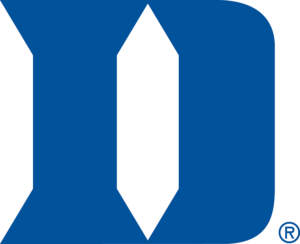 Duke
Duke 
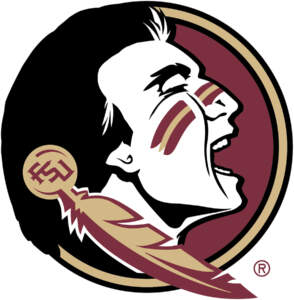 Florida State
Florida State 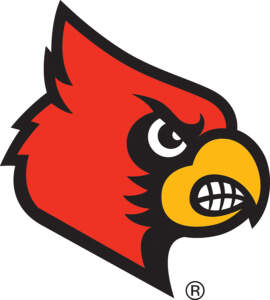 Louisville
Louisville 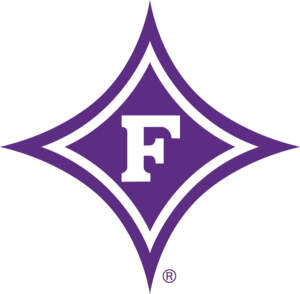 Furman
Furman 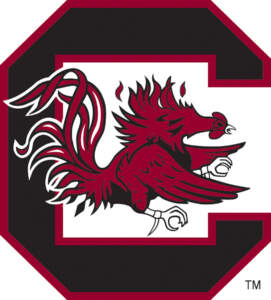 South Carolina
South Carolina  LSU
LSU 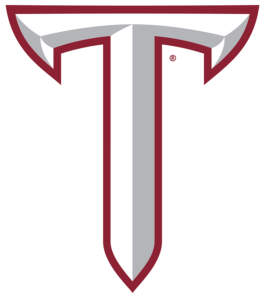 Troy
Troy 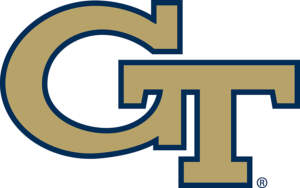 Georgia Tech
Georgia Tech 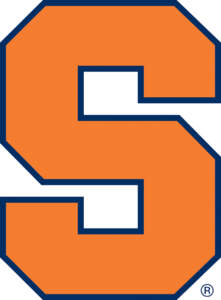 Syracuse
Syracuse 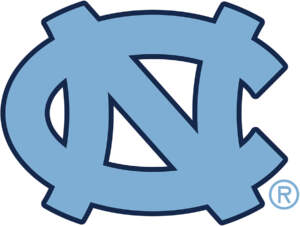 North Carolina
North Carolina 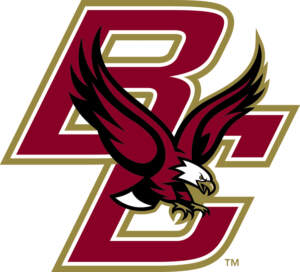 Boston College
Boston College 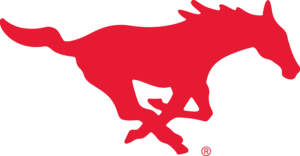 SMU
SMU 


